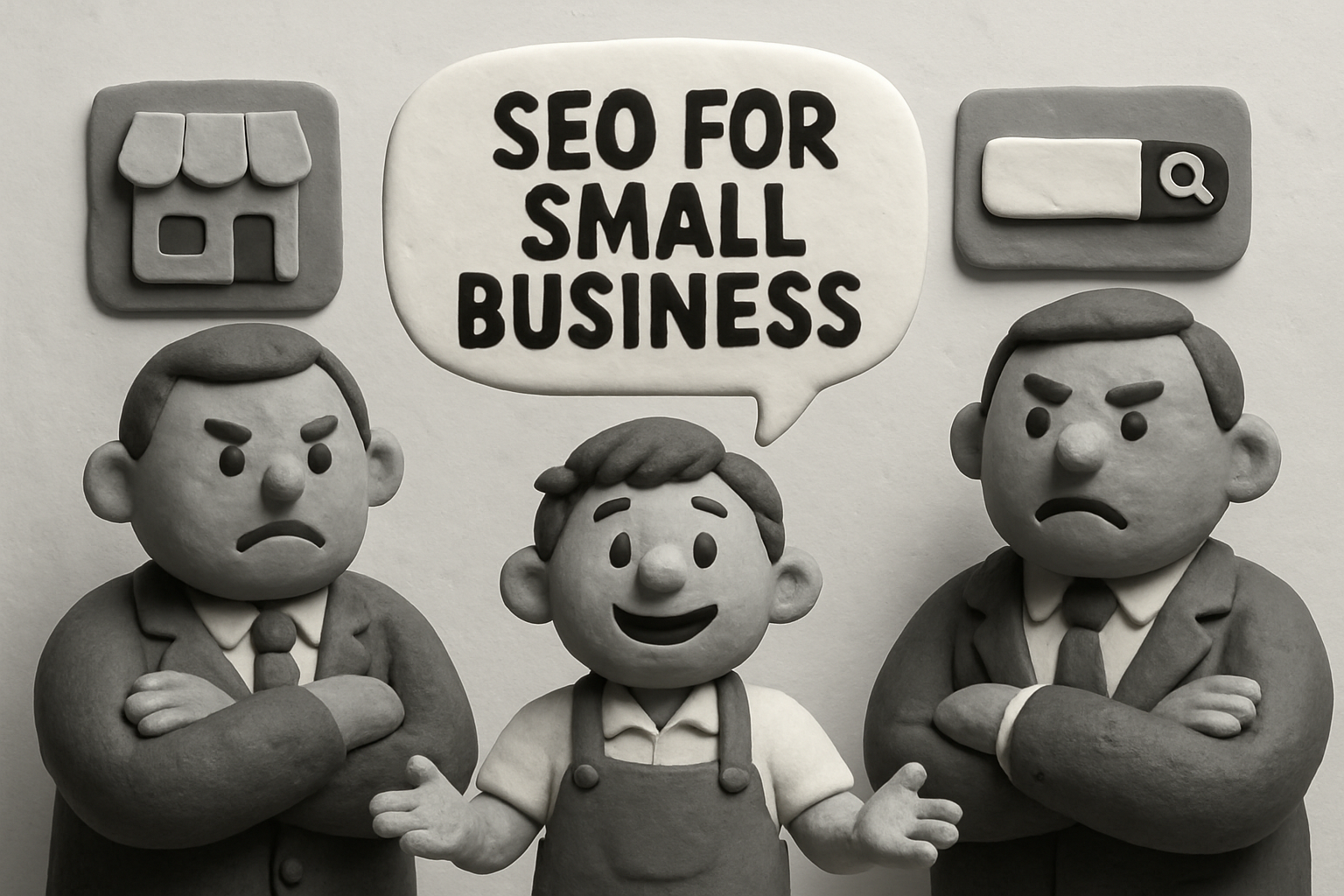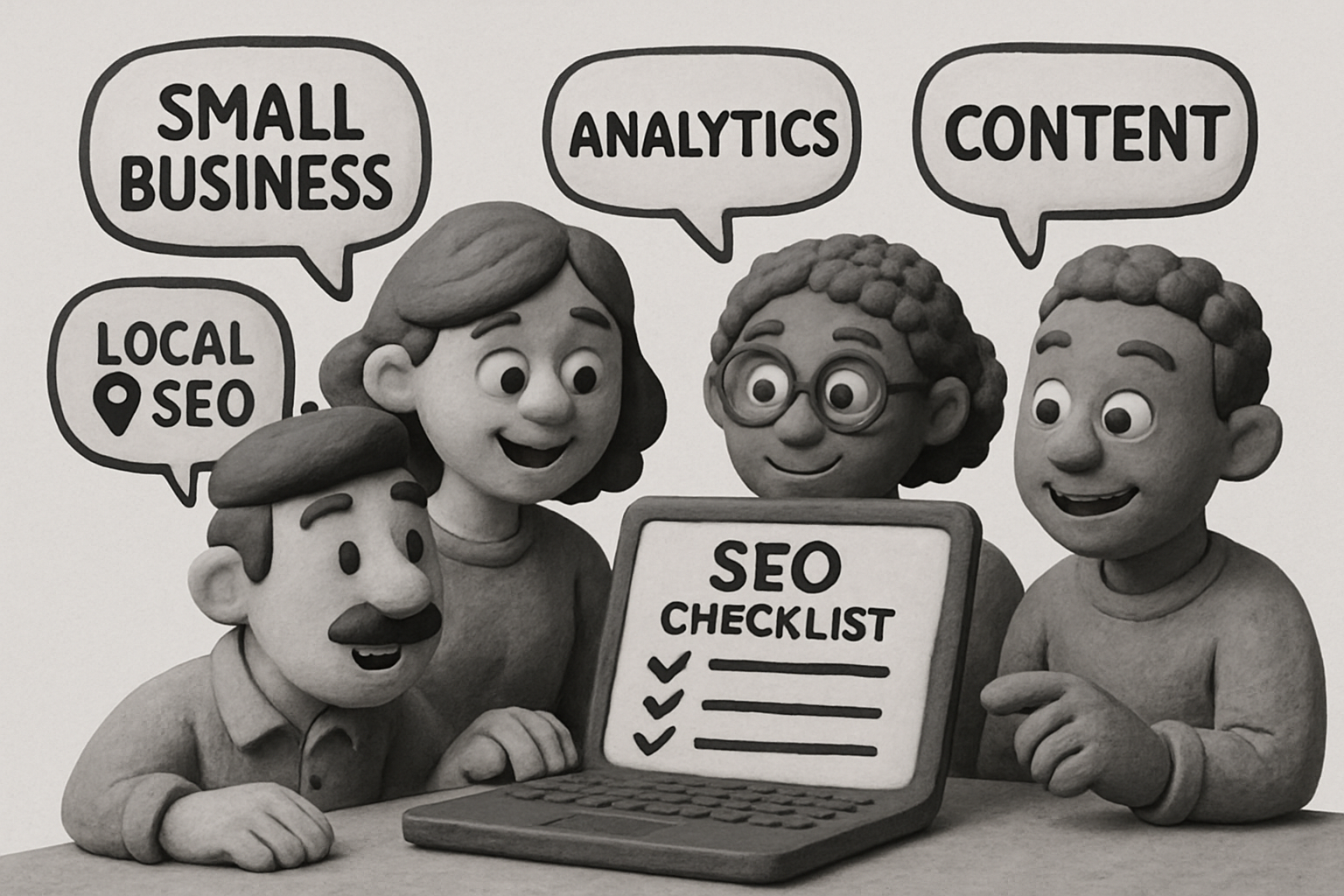In 2025, the digital landscape is more competitive than ever—standing out online can make or break a small business. With shifting algorithms and rising ad costs, knowing the right seo for small business strategies gives you a real edge.
This article is your go-to guide for proven, actionable SEO tips designed to help small businesses boost visibility, drive organic traffic, and fuel growth this year.
We’ll cover seven essentials, including keyword research, people-first content, local SEO, technical optimization, and more. Ready to attract more leads and sales? Dive in and put these tips to work for your business.
Why SEO Remains Critical for Small Businesses in 2025
In 2025, the digital landscape is more dynamic than ever. Both consumers and B2B buyers are turning to search engines as their primary method of discovering products, services, and solutions. For small businesses, this shift means that mastering seo for small business is no longer optional—it’s essential for staying visible and competitive in an increasingly crowded marketplace.

The Evolving Digital Marketplace
Every year, more people rely on online search to find what they need. Whether it’s a local bakery or a niche service provider, the journey almost always begins with a search engine. This puts seo for small business at the heart of customer acquisition and brand growth.
In fact, organic search remains the number one driver of website traffic. According to recent SEO Statistics 2025: Key Trends & Insights, organic search accounts for 53% of all online traffic. If your business isn’t showing up in those results, you’re missing out on a massive pool of potential customers.
The Cost-Effective Power of SEO
For small businesses with limited marketing budgets, paid advertising can quickly become unsustainable as costs rise year over year. By contrast, seo for small business offers a more affordable, long-term approach to building an online presence.
Unlike paid ads that stop delivering results the moment you pause spending, SEO efforts compound over time. The traffic you generate organically is not only cost-effective but also delivers a higher return on investment. This makes seo for small business the smart choice for businesses looking to maximize every marketing dollar.
Rising Competition and Google’s Algorithm Updates
As more businesses recognize the value of organic search, competition for top rankings continues to intensify. Google’s algorithm updates in 2024–2025 have placed a much stronger emphasis on user experience, E-E-A-T (Experience, Expertise, Authoritativeness, Trustworthiness), and genuinely helpful content.
Local intent is another game changer. Nearly half of all Google searches now have a local focus. That means local seo for small business is more vital than ever—optimized Google Business Profiles, consistent NAP citations, and positive reviews can help even the smallest local shop outrank national chains in local results.
The Compounding Effect: Early Investment Pays Off
One of the biggest advantages of seo for small business is its compounding effect. Early investment in SEO builds your website’s authority, making it easier to rank for more competitive keywords over time.
Consider these long-term benefits:
- Steady growth in organic traffic
- Increased brand visibility and trust
- Higher conversion rates from targeted searchers
- A sustainable edge over slower-moving competitors
Smart small businesses are already leveraging these strategies to punch above their weight class—outperforming bigger competitors by being more agile and locally relevant. In 2025, those who prioritize seo for small business will be best positioned for lasting success.
7 Essential SEO For Small Business Tips in 2025
Staying ahead in the digital landscape means making smart, future-proof decisions. As we head into 2025, these seven actionable tips will help you master SEO for small business—driving visibility, organic traffic, and growth, even with limited resources.

1. Prioritize Comprehensive Keyword Research and Intent Mapping
Effective SEO for small business starts with understanding what your audience is searching for—and why. Search intent is more nuanced than ever in 2025, spanning informational, navigational, transactional, and especially local queries.
Begin by tapping into affordable tools like Ahrefs, SEMrush, AnswerThePublic, and BuzzSumo. These platforms help uncover high-potential keywords that your competitors might overlook. Focus on long-tail and low-competition keywords for faster wins. For example, a bakery targeting “best gluten-free cupcakes in [city]” will likely see more relevant traffic than simply aiming for “cupcakes.”
Map your chosen keywords to specific business goals and stages of your customer journey. Are prospects looking for information, comparing options, or ready to buy? Aligning keywords with intent ensures your content meets their needs at the right time.
It’s also vital to analyze what your competitors rank for. Look for gaps—keywords they miss—and opportunities where you can outperform. Local modifiers like city names or “near me” can give your business an edge in local searches.
If you want a deeper dive on how to climb the rankings, check out Ranking for your keywords for actionable strategies tailored to SEO for small business.
Remember: Keyword rankings have a direct impact on organic traffic and conversions. Investing in smart research now sets the stage for sustained growth.
2. Create High-Quality, People-First Content
The heart of SEO for small business in 2025 is creating content that serves people, not just algorithms. Write in a way that’s engaging, relevant, and genuinely useful to your target audience.
Start by addressing your customers’ most common questions and pain points. FAQ sections can be a goldmine for both user experience and SEO. Use your target keywords naturally—avoid keyword stuffing, which can hurt your rankings and turn off readers.
Diversify your content formats. Mix traditional blog posts with in-depth guides, how-to videos, and eye-catching infographics. This not only keeps your audience engaged but also increases your chances of appearing in different search results, like featured snippets or video carousels.
Keep your content fresh. Regularly update existing articles to ensure accuracy and relevance. Outdated information can quickly push your pages down the search rankings.
Showcase your expertise with real-world examples, case studies, testimonials, and reviews. For instance, a service provider could publish “How to Choose the Right [Service] in [Location],” building trust and authority.
Pages that answer user intent and deliver value consistently rank higher and retain visitors longer. Make every piece of content count for your SEO for small business efforts.
3. Optimize for Local SEO and Google Business Profile
Local visibility is a game-changer for SEO for small business. Start by claiming and thoroughly optimizing your Google Business Profile (formerly Google My Business). Ensure your Name, Address, and Phone Number (NAP) are consistent across all directories and platforms.
Encourage customers to leave reviews—and always respond, whether the feedback is positive or negative. Google values active engagement, and positive reviews can boost your local rankings.
Add detailed business information: categories, services, opening hours, and high-quality photos. This helps your profile stand out and attracts more clicks.
Implement local schema markup on your website. This structured data signals to search engines that your business serves a specific area, improving your chances of appearing in local results.
Building local citations from reputable directories like Yelp, Yellow Pages, and your Chamber of Commerce strengthens your authority. For example, a restaurant optimizing these elements can rank higher for “best brunch near me”—outperforming larger chains.
Did you know 72% of consumers who perform a local search visit a store within 5 miles? Investing in local SEO for small business pays off by driving real, in-person customers.
4. Enhance Technical SEO and Site Performance
Technical SEO for small business is often overlooked, but it’s foundational to your online success. Mobile optimization is non-negotiable—Google uses mobile-first indexing, so your site must look and perform great on all devices.
Site speed is another critical factor. Compress images, implement caching, and minimize unnecessary code to improve load times. Faster sites keep visitors engaged and reduce bounce rates.
Address technical issues proactively. Fix broken links, eliminate duplicate content, and resolve crawl errors. These small tweaks can make a big difference in how search engines view your site.
Implement structured data (schema markup) for enhanced search results, like star ratings or event listings. Create and submit XML sitemaps to help search engines index your pages, and use robots.txt to guide crawlers appropriately.
Organize your website architecture for easy navigation. Use clear internal linking to guide visitors (and search engines) to your most important pages. For example, an e-commerce store that improves mobile experience and speed can see a direct lift in mobile sales.
Statistic: Sites that load quickly and offer seamless navigation tend to have higher conversion rates—a direct benefit for SEO for small business.
5. Build High-Quality Backlinks and Authority
Backlinks remain a cornerstone of SEO for small business. The focus in 2025 is firmly on quality over quantity—one relevant, authoritative link can outweigh dozens of low-quality ones.
Pursue backlinks from reputable sites in your industry. Guest posting, digital PR, and strategic partnerships are effective ways to earn these links. Create “linkable assets” like original research, insightful infographics, or useful tools—these naturally attract backlinks.
Avoid shortcuts like buying links or participating in link schemes. Not only can these tactics lead to penalties, but they often fail to deliver long-term value. Instead, monitor your backlink profile regularly and disavow any spammy links that appear.
Get involved with your local community. Sponsor events, join business associations, or engage with local media—these activities can yield powerful local backlinks. For example, a local business featured in a news article gains both exposure and a valuable link.
Data shows that high-quality backlinks remain a top ranking factor for Google. Prioritize building authority to amplify your SEO for small business strategy.
6. Leverage AI and Automation for Scalable SEO
AI and automation are revolutionizing SEO for small business, making it possible to do more with less. Use AI-powered tools to streamline keyword research, content creation, and competitor analysis.
Automate routine tasks like SEO reporting, site audits, and even internal linking. This frees up your time to focus on strategy and creative work. Consider deploying AI chatbots or content assistants to enhance customer experience and engagement on your website.
Always monitor AI-generated content for quality, accuracy, and consistency with your brand voice. While AI can help you scale, it’s your expertise and personal touch that build trust.
Scaling content production doesn’t have to mean sacrificing quality. With the right tools, small teams can publish more frequently—like a business using AI to post daily blogs and seeing steady traffic growth as a result.
Statistic: AI automation can reduce SEO workload by over 50% for small teams. Embrace these innovations to gain a competitive edge in SEO for small business.
7. Track, Measure, and Continuously Improve Your SEO Efforts
The final key to SEO for small business success is measurement and iteration. Set up Google Analytics 4 and Google Search Console for comprehensive tracking of your website’s performance.
Monitor key metrics: organic traffic, keyword rankings, click-through rates, and conversions. Regularly conduct content and technical SEO audits to uncover new opportunities and address issues.
Use UTM parameters and call tracking to accurately attribute leads and sales to your SEO campaigns. Benchmark your results against competitors and industry standards to see where you stand.
Stay agile—adjust your strategies based on performance data and search engine algorithm changes. For example, a business that identifies underperforming pages and optimizes them can double its leads.
Data shows that businesses who measure and iterate on their SEO for small business strategies consistently outperform those who set and forget. Make continuous improvement your mantra.
Common SEO Mistakes Small Businesses Should Avoid
Search engine optimization can be a game-changer, but even the best intentions sometimes go sideways. Many entrepreneurs dive into seo for small business without a clear roadmap, making avoidable errors that stall results or even lead to penalties.

Let’s break down the most common seo for small business mistakes:
- Ignoring mobile optimization and slow site speed—With most searches happening on smartphones, a clunky mobile site sends customers (and Google) running.
- Neglecting local SEO or inconsistent NAP citations—If your business info isn’t identical everywhere, you risk confusing both users and search engines.
- Overlooking high-quality, relevant content—Thin or generic pages won’t earn trust or traffic.
- Relying on black-hat tactics—Keyword stuffing, buying links, or duplicating content might promise shortcuts but often result in penalties.
- Not setting up or checking analytics and Search Console—You can’t improve what you don’t measure.
- Failing to engage with customer reviews or your local community online—Ignoring feedback and reputation can cost you rankings and trust.
Take, for example, a retailer who copied product descriptions from a supplier’s site and bought cheap backlinks. Their rankings tanked overnight, and it took months to recover. Sustainable seo for small business is all about patience, quality, and ongoing effort.
Interested in building a solid foundation? Check out these Startup SEO strategies for actionable steps. For a broader perspective, explore SEO Best Practices for Small Businesses in 2025 to future-proof your approach.
Avoid these pitfalls, and you’ll be well on your way to long-term growth.
How to Get Started: Actionable SEO Checklist for Small Businesses
Ready to put your plans into action? Getting started with SEO for small business doesn’t have to feel overwhelming. With the right steps and tools, you can set up a strategy that’s both effective and manageable—even with a lean team or budget.

Getting Started: The Essential SEO Checklist
Begin your journey with this practical checklist for SEO for small business:
- Claim and optimize your Google Business Profile—ensure your info is accurate and complete.
- Conduct keyword research tailored to your services, location, and target audience.
- Optimize your website for mobile, speed, and user experience.
- Create a content calendar to plan regular blog posts, FAQs, and updates.
- Set up Google Analytics 4 and Search Console for tracking progress.
- Request and respond to customer reviews to build local trust and rankings.
Break these tasks down into weekly goals to avoid burnout. Focus on one priority each week to build momentum.
Recommended Tools and Budget Tips
You don’t have to break the bank to succeed with SEO for small business. Many excellent free and affordable tools are available:
| Task | Free Tool Example | Paid Tool Example |
|---|---|---|
| Keyword Research | Google Keyword Planner | SEMrush, Ahrefs |
| Site Audit/Optimization | Google Search Console | Screaming Frog |
| Content Planning | Google Sheets | BuzzSumo |
| Tracking/Analytics | Google Analytics 4 | None needed |
For more options, explore these free SEO tools and tips to maximize your impact without overspending. Always prioritize the tools that fit your workflow and budget.
Next Steps: When to Seek Help & Example Roadmap
If you find yourself stretched thin or hitting a wall, consider consulting an SEO expert or agency—especially for technical fixes or advanced strategies. Many small businesses start solo and scale up later.
Here’s a sample 30-day action plan:
- Week 1: Claim Google Business Profile, audit website.
- Week 2: Complete keyword research, optimize key pages.
- Week 3: Launch content calendar, post your first blog.
- Week 4: Set up analytics, request reviews, review progress.
For deeper tactics, check out these powerful SEO strategies for small businesses in 2025. Remember: Consistency and persistence are your best allies in SEO for small business success.
You’ve just learned seven powerful SEO tips designed for small businesses in 2025—everything from smart keyword research to leveraging AI for easy content creation. If you’re ready to put these strategies into action but want to skip the overwhelm, why not make it effortless? With RankPill, you can automate content, uncover competitor insights, and keep your SEO on track—no technical expertise needed. Let’s turn these tips into real, measurable growth for your business together. Ready to take the next step?
Get Started